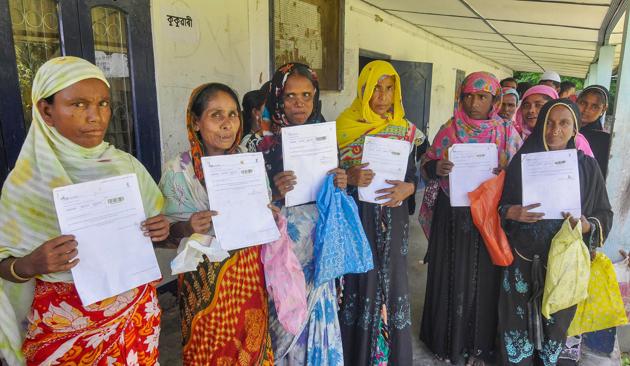How NRC is legitimising exclusion
The State’s excessive reliance on documents for proving citizenship is leading to harassment
The fractious and flawed implementation that marked the exercise of updating the recently released draft National Register of Citizens (NRC) in Assam has placed a much needed spotlight on the deeply fraught processes through which citizenship is constructed and experienced, especially by those on the margins, in contemporary India.

The NRC debate has focused on the communal undertones and associated dangers of creating a majoritarian notion of citizenship. But the NRC is a powerful illustration of another important dimension– the complex and deeply contested relationship between bureaucratic procedures, particularly the excessive reliance on paper and documents, and the construction of citizenship. Documents are the primary instrument through which individuals exercise their agency over the state by legitimising citizenship claims and seeking basic welfare entitlements. But these very documents are also a powerful instrument of state coercion and politically driven exclusion, used in this case to render nearly 4 million individuals temporarily stateless. The relationship with bureaucratic documents, for those who made it on the list thereby legitimising their claims to citizenship, is in stark contrast to those left out. Now as the country confronts the vexed question of what next, papers, documents and lists are going to be the critical to shaping the future of the 4 million individuals awaiting their second chance to certify and authenticate their claims to citizenship.
Scholarship on the construction of citizenship in contemporary South Asia has traced the central role of documents to the Partition experience. The newly formed governments in India and Pakistan adjudicated citizenship claims by evaluating documents like passports and later ration/ voter cards to determine their authenticity. This, as professor Niraja Jayal has argued inverted the standard relationship between citizenship and documents where possession of citizenship is the means to acquiring documents like passports that certify citizenship. In the Indian case, documents are the means for determining citizenship. This is precisely the dynamic that has unfolded in the NRC exercise. To be included in the NRC, the onus is on Assamese residents to furnish official documents in their possession as proof of citizenship on or before 1971, leaving it to the powers of the state to certify their authenticity.
Reportage from Assam offers vivid accounts of how disempowering this process has been. Routine state capacity failures – errors in data entry, misspelt names, differences in dates, names recorded across documents belonging to the same individual, slow verification procedures - have led the state to view its own documents with deep cynicism resulting in denial of claims. Even Panchayat certificates, an option for residents with no access to identity documents because of state failure, have been viewed with suspicion. The irony is inescapable. Rather than rectify its failure to perform even the most routine task –like furnishing documents- effectively, the state has turned its weakness into an instrument of coercion and arbitrary exercise of power.
When the state undermines the validity of its own documents, the effects on the everyday lives of those in possession of these “questionable” documents are severe. In a sobering ethnographic account, political scientist Vasudha Chhotray, documented the experiences of 1551 Bangladeshi settlers in Odisha who, through a process as arbitrary and laced with bureaucratese as the NRC, found themselves on a list that declared them “infiltrators”. Although never deported, in the eyes of the state, their presence on this list rendered documents in their possession - ration, BPL, voter cards – invalid resulting in denial of benefits. Crucially, the label “infiltrator” made those on the list vulnerable to the worst forms of social humiliation.
This research offers important insights into what will unfold in Assam in the coming months. Officials have repeatedly stated that those left out of the draft will enjoy all “entitlements and privileges” unless declared “foreigners” by a tribunal. However, it is likely, indeed inevitable given the vitiated political atmosphere; the BJP President, Amit Shah, was quick to insert the language of “infiltrators” and “illegal immigrants” into the unfolding political slugfest; that those “left out” will suffer the worst forms of exclusion and humiliation, even as they struggle to reassert the value of their documents prove their citizenship. Ironically, the final round of verification, currently underway, is creating a new wave of documents– forms for claims, objections and corrections – whose authenticity will be certified by the bureaucracy.
The Indian state is well known for its passion for paper characterized evocatively by anthropologist Nayanika Mathur as the “paper state”. The NRC is a powerful reminder of the worst excesses of the “paper state”. In a weak capacity state, where documents are thinly and poorly distributed, excessive reliance on paper to mediate citizenship is a powerful instrument of state coercion and legitimised exclusion. Four million Assamese residents are victims of this. Their future freedoms now dependent on a new set of documents and the vagaries of the “paper state”.
Yamini Aiyar is president and chief executive, Centre for Policy Research, New Delhi
The views expressed are personal



